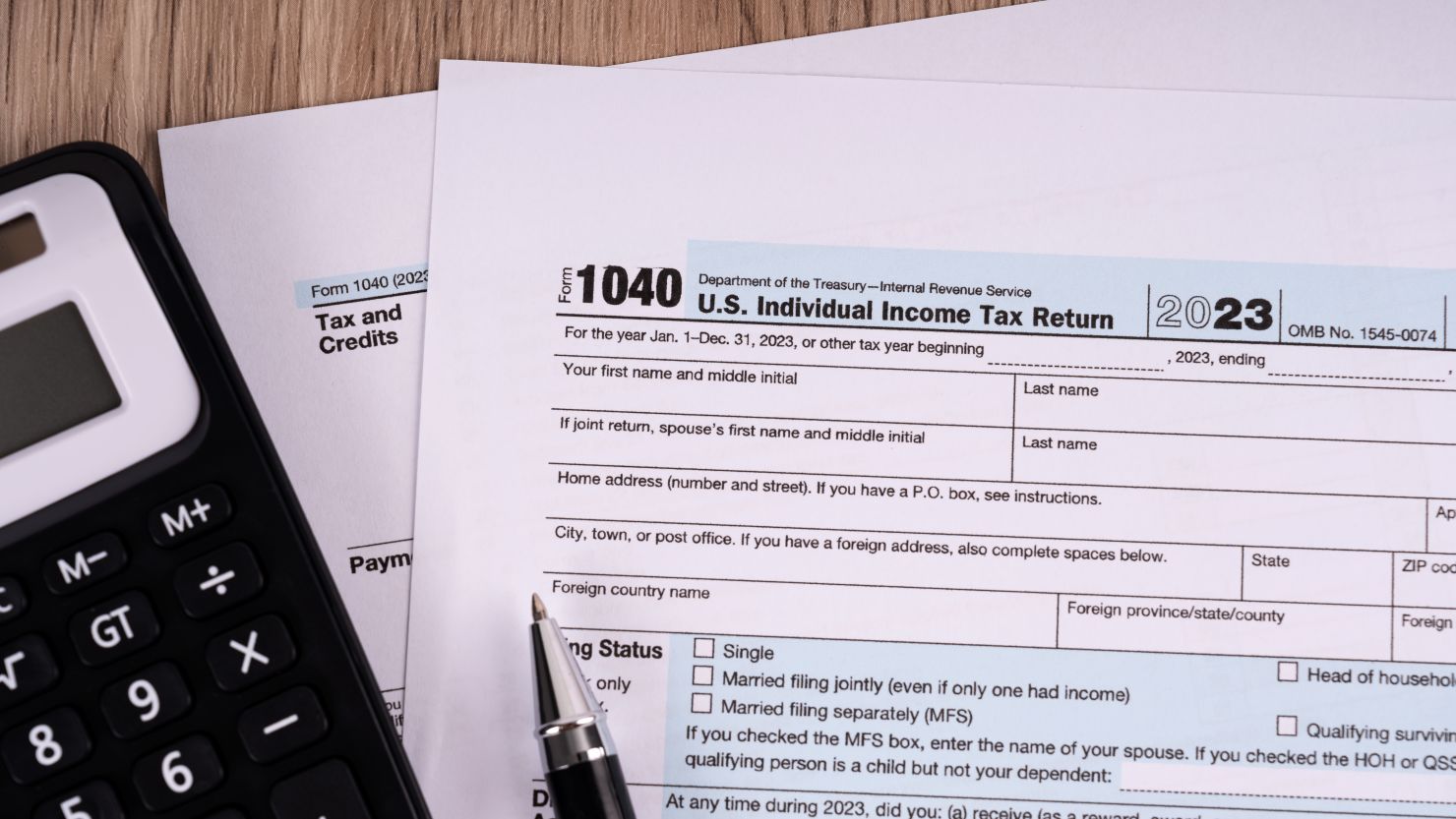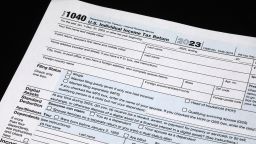It’s Tax Day in the United States.
Some Americans are scrambling to get their documents in on time, while others are figuring out how to pay what they owe or enjoying a return of cash from the IRS. Either way, it’s fair to say that filing taxes is stressful business.
This year, it’s estimated that taxpayers will spend $104 billion on out-of-pocket expenses associated with preparing and submitting tax forms, according to a recent report by the National Taxpayers Union Foundation. They’ll also spend an estimated 6.55 billion collective hours preparing their documents to comply with tax laws.
“We have built ourselves a house of cards that is unlike anything else in the developed world,” said Bill Harris, the former CEO of Turbotax and founding CEO of Paypal. “The tax code is so complex that it takes a tremendous amount of time and money for many people to file,” he told CNN.
It’s particularly difficult for investors, he said, who have to report their earnings and losses from the market to the IRS.
“If I had a magic wand I would create a dramatic and massive reform of the tax code and make it hugely simpler,” he said.
But he doesn’t.
As an alternative, Harris, who currently heads financial services firm Evergreen Money and recently authored a book about reducing tax burdens, shared his three biggest tax tips for investors with Before the Bell.
It’s not all about the 401(k): “You should absolutely max out your 401(k) to the point of your employer match,” said Harris. “It’s free money.”
Beyond that match, he said, there are other vehicles you can hold your retirement money in.
If you think of stocks as a long-term investment, it’s logical to want to hold them in your retirement account. But that’s a mistake, he said.
“What you want to do is you want to put your income generating assets in your tax-advantaged accounts [like 401(ks) and Roth IRAs], because those are the ones who are really getting taxed high,” he said. “Then you put your capital gain assets in your taxable accounts.”
If you hold stocks for more than 12 months, the top federal tax rate for capital gains is 20%, not 37% like income tax, so “you’re already ahead,” he said.
From there, just defer selling for as long as you can, he said. “You can defer as long as you want and pay no tax,” he said.
If you have to sell, harvest your losses: Every now and then, you should review your stock portfolio to understand its tax implications, said Harris.
An increase over your purchase price results in an unrealized capital gain (a profit that exists on paper but hasn’t been cashed in yet), while a decrease indicates an unrealized loss. These gains or losses only become “realized” and taxable when you sell, he explained.
So for tax purposes, selling securities that have lost value can offset the taxes due on gains from successful investments. If your losses exceed your gains, you can carry the net loss (total losses minus total gains) into the next tax year, potentially reducing future tax burdens.
But, he warned, be cautious of the “wash sale” rule. You can’t recognize a tax loss if you repurchase the same security within 30 days of selling it. Frequent trading, leading to short-term gains (profits from assets held for a short period, typically less than a year), is taxed at higher ordinary income rates and may result in underperformance compared to the market.
Give back: Investments rise over time. And even if you defer and offset their sales, “you’re eventually going to have some stocks with a high percentage of appreciation,” said Harris. “You can ultimately just sell and pay the tax, but you can also actually eliminate even that part in a number of ways.”
The first is through charitable giving. “What you do is always only give those highly appreciated securities,” he said. “With a relatively small amount of charitable giving, you can eliminate a lot of tax.”
If you have children, each parent can give each of their children $17,000 a year tax free, he said. If you have three children and two parents, that’s $108,000 in tax free money a year, Harris said.
You don’t have to be ultra-wealthy to start a tax-free trust fund for your kids, either. Parents can open custodial accounts for their young children, he said, and start accumulating those cash gifts right away.
Oil prices dip but gold climbs as Israel weighs response to Iran’s attack
Oil prices eased Monday but gold rose and global stocks were mixed as rising geopolitical tensions in the Middle East spurred demand for safe haven investments after Iran launched an unprecedented attack on Israel, report my colleagues Laura He and Anna Cooban.
The price of Brent crude dipped below $90 a barrel, while US WTI crude dropped by 1% to $84.50 by 4.46 a.m. ET. Traders are waiting to see what Israel does next.
Oil prices hit their highest levels since October Friday in anticipation of retaliation by Tehran for a suspected Israeli strike on an Iranian diplomatic complex in Syria. US crude futures have risen 18% this year. Brent crude, the global oil benchmark, has surged more than 16%.
Europe’s benchmark Stoxx 600 index ticked up 0.3% in mid-morning trade, while Germany’s DAX and France’s CAC 40 were up 0.8% and 0.6% respectively. London’s FTSE 100 fell 0.4%.
Hong Kong’s Hang Seng Index closed down 0.7%. Japan’s Nikkei 225 closed 0.7% lower, but China’s Shanghai Composite Index finished 1.3% higher.
Spot gold was up 0.3% at $2,349 per ounce on Monday. It had hit an all-time high of $2,431 per ounce on Friday because of fears of a potential attack by Iran on Israel. So far this year, bullion has surged nearly 14%.
The Paris-based International Energy Agency, which monitors oil markets on behalf of developed economies, said Monday that Iran’s weekend air attacks on Israeli military facilities had raised the risk of increased volatility in oil markets and provided a fresh reminder of the importance of oil security.
Analysts at ANZ said in a research report that the attack would raise concerns about possible disruption to global oil supply.
“The extent of that risk will likely be determined by the reaction of Israel’s government,” the analysts added.
Israel’s war cabinet met for several hours Sunday to discuss its response and was due to meet again at 7 a.m. ET Monday, an Israeli official told CNN.
Google removes links to California news sites, citing proposed state law requiring payment to publishers
Google is removing links to California news websites in reaction to proposed state legislation requiring big tech companies to pay news outlets for their content, the company announced Friday in a blog post.
Google, which is a subsidiary of Alphabet (GOOGL), wrote the move would affect only a small percentage of California users, and is intended as a “test,” allowing the company to gauge “the impact of the legislation on our product experience.”
The California Journalism Preservation Act, which was introduced in March 2023 and is still awaiting a hearing by the state’s Senate Judiciary Committee, would require digital platforms like Google and Meta to pay a “journalism usage fee” to eligible news outlets when they use their content alongside digital ads.
On Friday evening, California State Senate President Pro-Tempore Mike McGuire, a co-author of the bill, called the move an act of “bullying” and an “abuse of power.”
“This is a dangerous threat by Google that not only sets a terrible precedent here in America, but puts public safety at risk for Californians who depend on the news to keep us informed of life-threatening emergencies and local public safety incidents,” he wrote in a post on X, formerly known as Twitter. “This is a breach of public trust and we call on Google executives to answer for this stunt.”
Lawmakers and proponents of the bill argue tech giants make money by sharing content from small and local news publishers, but the publishers do not reap the same financial benefits.









